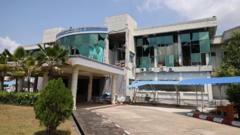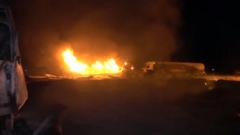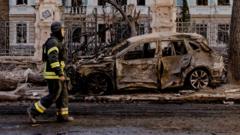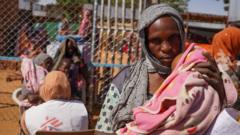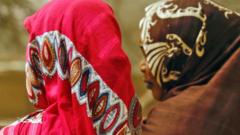In the wake of a brutal attack on the Zamzam camp, internally displaced individuals are fleeing towards the town of Tawila. Many families are enduring severe hardships, losing loved ones, possessions, and facing physical injuries along a perilous journey.
Desperate Escape from Violence: Sudanese Families Strive for Safety
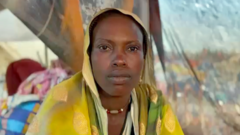
Desperate Escape from Violence: Sudanese Families Strive for Safety
Survivors recount harrowing tales as the Zamzam camp in Sudan faces devastation and violence from paramilitary forces.
The 700,000 residents of Sudan’s Zamzam camp were already grappling with extreme poverty when they were violently attacked last week by paramilitary fighters. The camp, the largest for internally displaced people in the region, had seen individuals escape years of violence, only to have their lives destabilized anew by an assault from the Rapid Support Forces (RSF).
Zamzam camp was built in response to ethnic violence in Darfur and housed many who had fled their homes seeking refuge. However, the RSF's violent incursion in an attempt to capture the nearby city of el-Fasher has left the camp in ruins, with officials declaring it “completely destroyed.” North Darfur Health Minister Ibrahim Khater emphasized the current desolation, stating, “No-one is there."
Among the countless who escaped is Fathiya Mohammed, a mother of two who was at Zamzam camp for only three months. She described her harrowing four-day journey to Tawila, where she carried a child on her back and another in her arms while balancing luggage on her head. In the chaos, she lost her husband and explained how persistent threats from thieves compounded their suffering as they fled.
Medical charity Doctors Without Borders (MSF) reports that tens of thousands have fled to Tawila since the assault. Saadiya Adam, another displaced resident, recounted the loss of all her possessions to the flames. “They burned my house in Zamzam and they burned my sheep,” she lamented.
Video footage of the exodus reveals the dire situation, with thousands arriving in Tawila by various means, adding to the strain on already overwhelmed resources. Tawila hospital has seen a sharp influx of patients, with the head nurse reporting a worrying trend of gunshot injuries becoming “routine,” and the harsh realities of war echoed through the stories of the injured.
Issa Abdullah, who survived an attack, cited the danger that looms in Zamzam while describing his ordeal. “Three vehicles opened fire over us,” he detailed, showcasing the violence that many continually endure. MSF indicated that in the aftermath of the attack, they had received more than 170 individuals suffering from gunshot wounds in just two days, highlighting the perilous conditions many were forced to leave behind.
The RSF has not responded to specific accusations of violence or robbery amidst the chaos. Nevertheless, the growing humanitarian crisis is evident as MSF notes that many vulnerable individuals remain behind, unable to escape. The RSF’s strategic move to seize control of Zamzam intensifies fears of a divided Sudan, with calls for peace resonating from survivors like Mohammed, who simply wish for an end to the violence that has uprooted their lives: “Peace is the most important thing.”

